How to Perform Automated Regression Testing in ServiceNow?

ServiceNow is a popular software that helps businesses create workflows for automating and managing their various processes, including incident management, employee onboarding, HR operations, etc. This makes ServiceNow an important part of the core technology infrastructure of a company and necessitates comprehensive maintenance to ensure peak performance. Regression testing is important to maintain the integrity and functionality of dynamic environments like ServiceNow. It ensures that any change or modification doesn’t introduce any new bugs or defects in your ServiceNow instance.
This blog post will provide actionable advice to testing teams on Automated Regression Testing in ServiceNow, steps to implement it, key challenges, and how best to address them. We will also discuss automating the ServiceNow regression testing process.
What is ServiceNow Regression Testing?
Enterprise software normally undergoes frequent customization, updates, or other types of changes to meet a business's evolving needs. Regression testing is a testing process that ensures that any code change in an existing ServiceNow implementation doesn’t adversely impact its functionality. This is done by testing the implementation every time the code changes and detecting and fixing the bugs as soon as possible.
Objectives of ServiceNow Regression Testing
Some of the key objectives of Automated Regression Testing in ServiceNow can be -
- Ensure any new updates, changes, or customizations don’t break functionality and the performance of existing ServiceNow implementation.
- Support Continuous Integration/Continuous Delivery (CI/CD) to facilitate seamless deployment of new features and updates.
- Ensure custom workflows and integrations work perfectly after changes and updates.
- Create rapid feedback loops for early detection and fast resolution of bugs.
- Enhance user experience by providing a reliable application behavior
- For regulatory compliance and data integrity
Key Challenges
While Automated Regression Testing in ServiceNow implementations is an excellent way to ensure its peak performance all the time, there are many challenges that a testing team must address while executing it. Some of the popular challenges are -
- ServiceNow platforms have complex workflows with multiple branches and decision points. This requires enhanced test coverage.
- Frequent updates and customizations to the platform require regular test script maintenance, which adds to the administrative burden.
- ServiceNow integrates with multiple systems, apps, and data. Maintaining integrating dependency across systems can be challenging.
- Managing test data that mimics a production environment can be challenging.
- Enhance user experience by providing a reliable application behavior
- For regulatory compliance and data integrity
Steps to Implementing ServiceNow Regression Testing
Step 1: Establish your Testing Strategy
A well-defined strategy ensures that your Automated Regression Testing in ServiceNow process focuses on your requirements and delivers results. Carefully review your ServiceNow implementation to set clear scope and goals for your process.
Step 2: Select the Right Test Cases
Identify workflows, functionalities, and customizations critical to your operations. Prioritize these critical areas based on risk/impact and document test cases for each of them.
Step 3: Set up the Testing Environment
Create a dedicated testing environment that mirrors the development environment. Ensure consistent environment configurations, permissions, and secure access to the testing environment.
Step 4: Prepare Test Data
Create representative test data sets. Protect sensitive data by masking and anonymizing it. Implement automated processes for data setup and teardown. Ensure data integrity across tests.
Step 5: Execute Regression Testing
Run your tests on ACCELQ. Schedule tests after every application change or update. Execute manual tests for scenarios outside the scope of automated testing.
Step 6: Monitor and Analyze Test Results
Generate test execution reports using built-in reporting tools in ACCELQ. Perform root cause analysis on failed tests and prioritize and fix issues based on impact and risks.
Step 7: Optimize the Testing Process
Review and optimize the testing process regularly based on test reports and feedback. Maintain test scripts as application changes occur.
Step 8: Collaborate with other stakeholders
Share test results with development, QA, and other participants. Establish a feedback loop to drive continuous improvement.
Step 9: Ensure compliance
Conduct compliance tests to ensure regulatory adherence. Ensure that app updates or changes follow industry regulations. Protect sensitive data.
Automated Regression Testing in ServiceNow
Automated Regression Testing in ServiceNow process will not only help you reduce human labor and costs but also help you automatically run tests after every update or change in the application. This will enhance testing coverage and help you detect issues early in the SDLC. Many automation tools and frameworks, such as ACCELQ, are available to help you automate regression testing in ServiceNow. Here’s how to take the process forward -
- Use scriptless automation to design test cases using a visual interface.
- Make use of AI-based tools to self-heal and reduce manual maintenance of scripts.
- Use CI tools to integrate automated testing into the development pipeline.
- Ensure continuous execution of automated tests in the CI/CD process.
- Build dashboards and integrate test results to ensure real-time tracking and analysis.
Conclusion
Automating regression testing in ServiceNow ensures the reliability and peak performance of the platform. Selecting the right automation tools helps you smoothen the entire process and extract desired results from it. ACCELQ, our AI-powered test automation tool, can be your ideal partner in the process. ACCELQ is an official ServiceNow Partner and is aligned with ongoing ServiceNow releases and version changes. ACCELQ ServiceNow is a ready-to-go regression suite with built-in best practices and template projects.
Yuvarani Elankumaran
Technical Consultant at ACCELQ
Yuvarani Elankumaran is a highly skilled technical consultant at ACCELQ. With over a decade of experience in the field of Test Automation, Yuvarani is a seasoned professional who is well-versed in a variety of programming languages and automation frameworks.
Discover More
 Test Automation in Financial Services With ACCELQ
Test Automation in Financial Services With ACCELQ
Test Automation in Financial Services With ACCELQ
 What is Selenium? What are the challenges in Selenium Automation?
What is Selenium? What are the challenges in Selenium Automation?


































